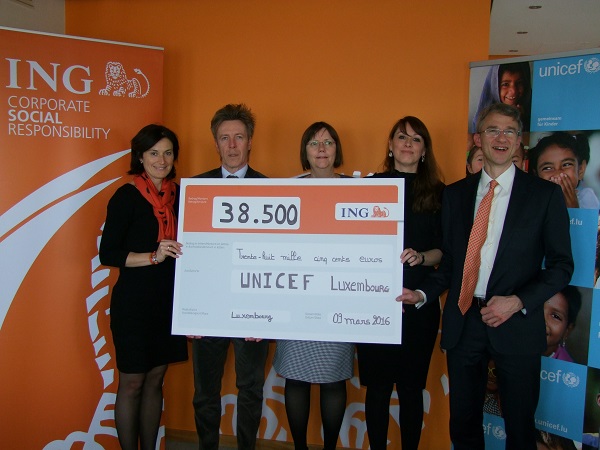
On Wednesday, ING Luxembourg held a press conference to announce and explain the donation of €38,500 to Unicef Luxembourg which will go towards a project to educate adolescents in Zambia, Africa.
Luc Verbeken, CEO of ING Luxembourg, explained how sustainability is embedded in the strategy of ING Luxembourg. In this case, €0.01 per ING Luxembourg credit card transaction throughout 2015 goes towards the Unicef project in Zambia.
For the past 10 years, ING and UNICEF have worked together to support children and young people in underprivileged regions. Initial projects supported premature babies in the region, then this went on to support children aged up to 10 years. Last year the focus changed and the initiative now supports adolescents in the region, i.e. those aged between 10 and 19 years. The initiative provides access to education and a better social environment.
"ING wants to continue to support children from the most underprivileged regions of the world. That is why our Visa initiative continued in 2015 and the amounts collected will be used to help Zambian teenagers build their futures. In 2016, we will continue to support teenagers and will report back on our work in early 2017," explained Luc Verbeken, Chief Executive Officer of ING Luxembourg.
Sandra Visscher, Executive Director of UNICEF-Luxembourg, talked about the country which has a population of circa 14 million, and is a peaceful country. However, it is not wealthy, with three quarters of the population living on less than $1.50/day. 65% of adolescents grow up in poverty and face issues such as HIV and AIDS (40% of new infections are of people aged 15-24 years), and access to prevention and care remains limited. One third of adolescents do not go to secondary school, and one half of all girls marry before they reach 18.
The proposed initiative supported by Unicef and ING internationally is to help them make informed decisions on health, finance, social life and political decisions. How? By developing and using the social messaging tool U-Report which is used on mobile technology. U-Report offers a free platform which allows young people to ask questions and receive informed answers from trained professionals on sensitive subjects such as AIDS prevention. It also enables surveys on social issues, the results of which are used to feed into policy-making. In addition, Unicef workers go into schools and youth clubs to interact with adolescents.
The Power for Youth programme is aimed at teenagers in six countries, including Zambia. The U-Report tool not only strengthens the link with available health and protection services, but also encourages mutual learning and skills development.
"As young girls and boys grow up, the community gives them more responsibilities and they gain new experience, enabling them to become more independent. Teenage years are a time when young people shape their plans for life and develop values and skills which will have an impact on their well-being. Experience shows that if young people are supported and encouraged by adults and if policies and services are adapted to their needs and their potential, they can break the cycle of poverty, discrimination and violence," explained Sandra Visscher, Executive Director of UNICEF-Luxembourg.
Photo by Geoff Thompson








